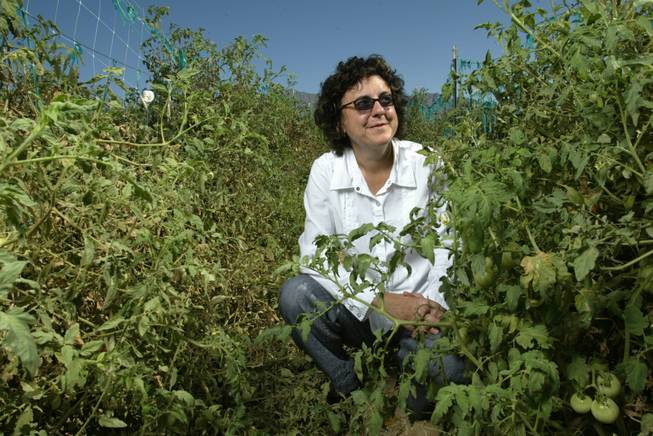
Christine Bergman, a food scientist and “slow food” advocate, is surrounded by tomato plants at Gilcrease Orchards, outside northern Las Vegas. At the college, she teaches would-be restaurant managers about sustainability.
Friday, Sept. 25, 2009 | 2 a.m.
Christine Bergman is an established laboratory scientist specializing in rice and considers herself part of the slow food movement, an advocate for environmentally responsible food that is local, sustainable and healthy.
So what the heck is she doing in Las Vegas? And not just teaching in but the associate dean of UNLV’s College of Hotel Administration?
The short answer is that she left a job with the U.S. Agriculture Department in Texas and moved here six years ago to take care of her mother. But the better question is, how does she live here?
As far as Bergman knows, she’s the only food scientist in Nevada. (“It’s extremely lonely. I hadn’t thought about it that way until you said something,” Bergman says with a laugh.) The words “sustainable” and “Las Vegas” do not often share the same breath without laughter. And rice? It is not commonly farmed in the desert.
“I’m a fish out of water,” Bergman says. “I’m a biological scientist in the hotel college. Plus, I don’t have a lab, so I guess I’m doubly out of water.”
She borrows lab time whenever she can from other professors. Bergman’s still working with the USDA on rice, trying to develop a strain with a rot-resistant bran.
Bran is the outer shell of a rice grain. The difference between brown rice and white rice is whether the bran has been milled off — think of the difference between the two as the difference between whole wheat and white bread. Brown rice can lower your cholesterol count and prevents starch absorption, which is good for diabetics. The problem with brown rice — and the reason the vast majority of rice in the world is milled white race — is that it goes rancid more quickly than white rice.
About 660 million metric tons of rice are grown around the world, meaning any improvement Bergman makes could improve the lives of millions, even billions.
(Oh, and about the weirdness of studying rice from the desert — it’s only weird when viewed from outside academia. UNLV also has a professor who has studied the rainfall over the isthmus of Panama.)
But Bergman doesn’t teach rice at the College of Hotel Administration. She teaches would-be restaurant managers about sustainability.
It’s not a traditional subject at the school, but Bergman says it’s useful knowledge for tomorrow’s restaurant managers. For one thing, as consumers grow more interested in sustainable food, going green can be good marketing for a restaurant. And for another, conserving energy and water can save money, as can buying nearby, in-season food with lower transportation costs. Such savings can offset costlier parts of going green, such as using environmentally safer soap.
It’s not always an easy sell, Bergman says, but not as hard as you might expect. Most of the students come in with at least some interest in environmentalism. It’s just a matter of showing them it can be good business.
Bergman says she never expected to become a teacher.
Born in Oxnard, Calif., Bergman was raised in New Hampshire and southern Australia, where the temperature one Christmas Day was 118 degrees, which made her vow never to live in the desert again, which later taught her a lesson about making vows. She was the first in her family to go to college, an achievement she shares with many of her students, which she says has made it easy for her to get along with students.
Now, teaching is one of the most enjoyable parts of her life.
“I never wake up in the morning and don’t want to go to work.”

Join the Discussion:
Check this out for a full explanation of our conversion to the LiveFyre commenting system and instructions on how to sign up for an account.
Full comments policy